Postpartum Depression: Social Factors, Health Behaviors and Models
VerifiedAdded on 2021/12/26
|10
|2399
|19
Report
AI Summary
This report provides a comprehensive overview of postpartum depression, a common mental disorder affecting women after childbirth. It explores the causes and detrimental outcomes of postpartum depression, including its impact on both the mother's quality of life and the baby's development...
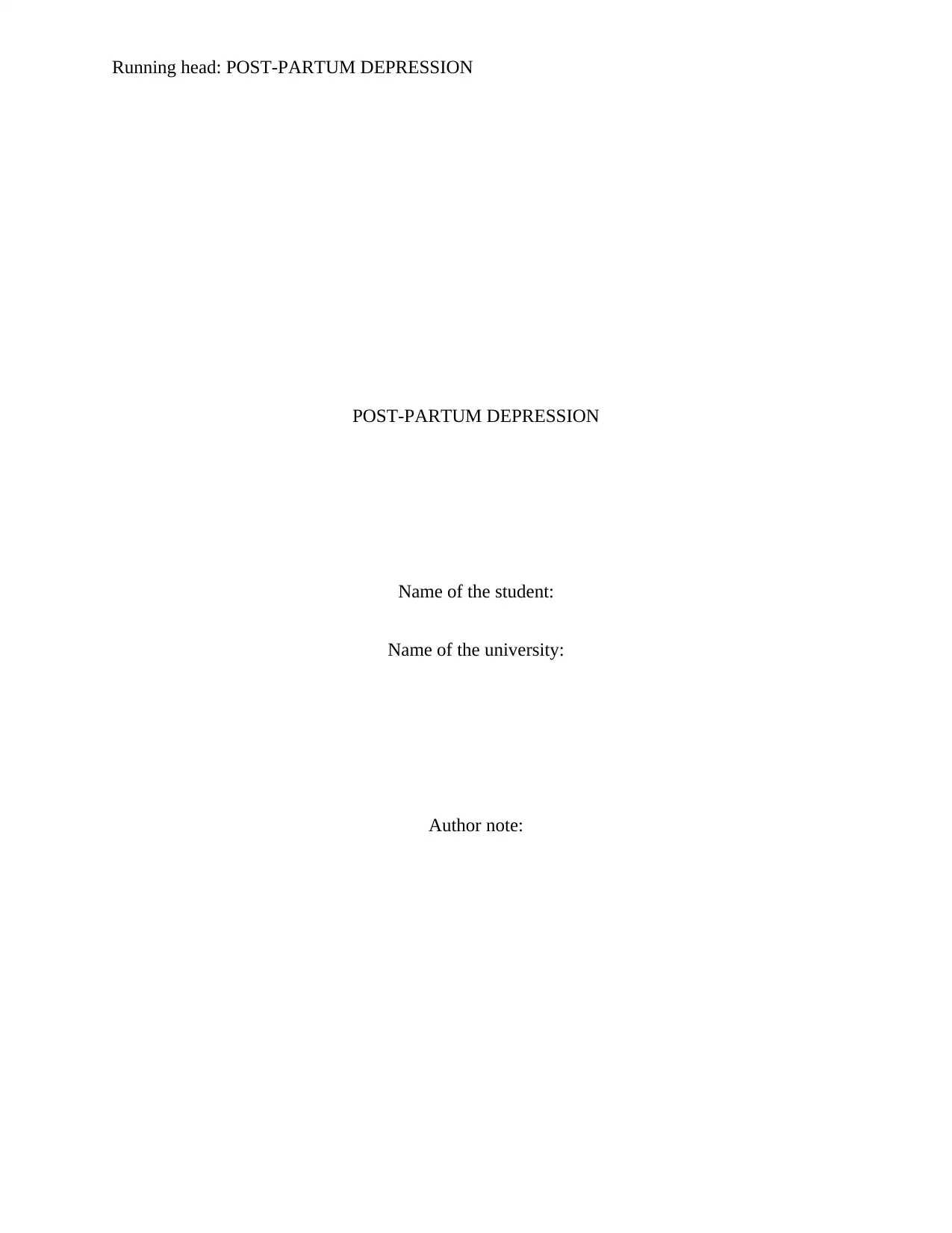
Running head: POST-PARTUM DEPRESSION
POST-PARTUM DEPRESSION
Name of the student:
Name of the university:
Author note:
POST-PARTUM DEPRESSION
Name of the student:
Name of the university:
Author note:
Paraphrase This Document
Need a fresh take? Get an instant paraphrase of this document with our AI Paraphraser
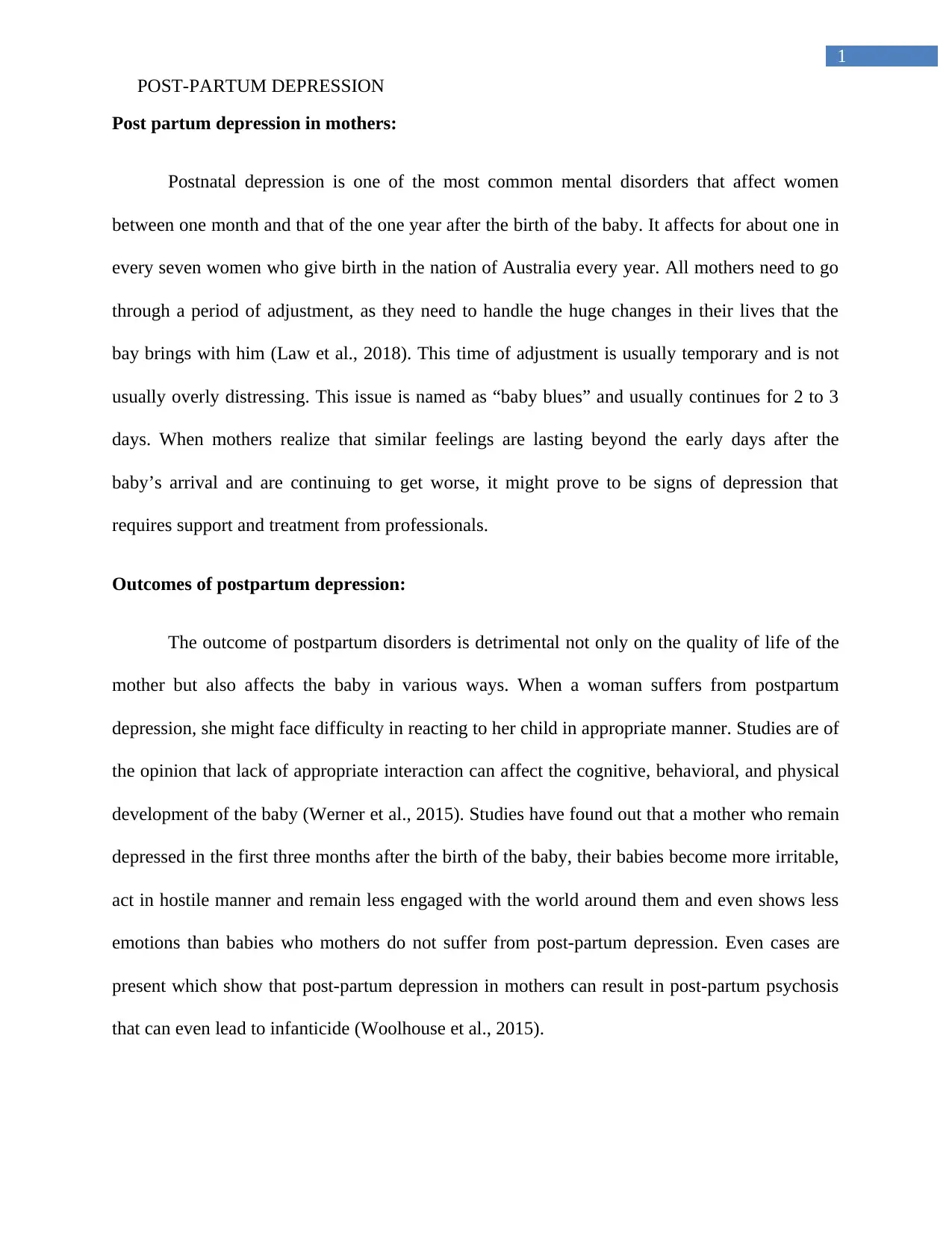
1
POST-PARTUM DEPRESSION
Post partum depression in mothers:
Postnatal depression is one of the most common mental disorders that affect women
between one month and that of the one year after the birth of the baby. It affects for about one in
every seven women who give birth in the nation of Australia every year. All mothers need to go
through a period of adjustment, as they need to handle the huge changes in their lives that the
bay brings with him (Law et al., 2018). This time of adjustment is usually temporary and is not
usually overly distressing. This issue is named as “baby blues” and usually continues for 2 to 3
days. When mothers realize that similar feelings are lasting beyond the early days after the
baby’s arrival and are continuing to get worse, it might prove to be signs of depression that
requires support and treatment from professionals.
Outcomes of postpartum depression:
The outcome of postpartum disorders is detrimental not only on the quality of life of the
mother but also affects the baby in various ways. When a woman suffers from postpartum
depression, she might face difficulty in reacting to her child in appropriate manner. Studies are of
the opinion that lack of appropriate interaction can affect the cognitive, behavioral, and physical
development of the baby (Werner et al., 2015). Studies have found out that a mother who remain
depressed in the first three months after the birth of the baby, their babies become more irritable,
act in hostile manner and remain less engaged with the world around them and even shows less
emotions than babies who mothers do not suffer from post-partum depression. Even cases are
present which show that post-partum depression in mothers can result in post-partum psychosis
that can even lead to infanticide (Woolhouse et al., 2015).
POST-PARTUM DEPRESSION
Post partum depression in mothers:
Postnatal depression is one of the most common mental disorders that affect women
between one month and that of the one year after the birth of the baby. It affects for about one in
every seven women who give birth in the nation of Australia every year. All mothers need to go
through a period of adjustment, as they need to handle the huge changes in their lives that the
bay brings with him (Law et al., 2018). This time of adjustment is usually temporary and is not
usually overly distressing. This issue is named as “baby blues” and usually continues for 2 to 3
days. When mothers realize that similar feelings are lasting beyond the early days after the
baby’s arrival and are continuing to get worse, it might prove to be signs of depression that
requires support and treatment from professionals.
Outcomes of postpartum depression:
The outcome of postpartum disorders is detrimental not only on the quality of life of the
mother but also affects the baby in various ways. When a woman suffers from postpartum
depression, she might face difficulty in reacting to her child in appropriate manner. Studies are of
the opinion that lack of appropriate interaction can affect the cognitive, behavioral, and physical
development of the baby (Werner et al., 2015). Studies have found out that a mother who remain
depressed in the first three months after the birth of the baby, their babies become more irritable,
act in hostile manner and remain less engaged with the world around them and even shows less
emotions than babies who mothers do not suffer from post-partum depression. Even cases are
present which show that post-partum depression in mothers can result in post-partum psychosis
that can even lead to infanticide (Woolhouse et al., 2015).
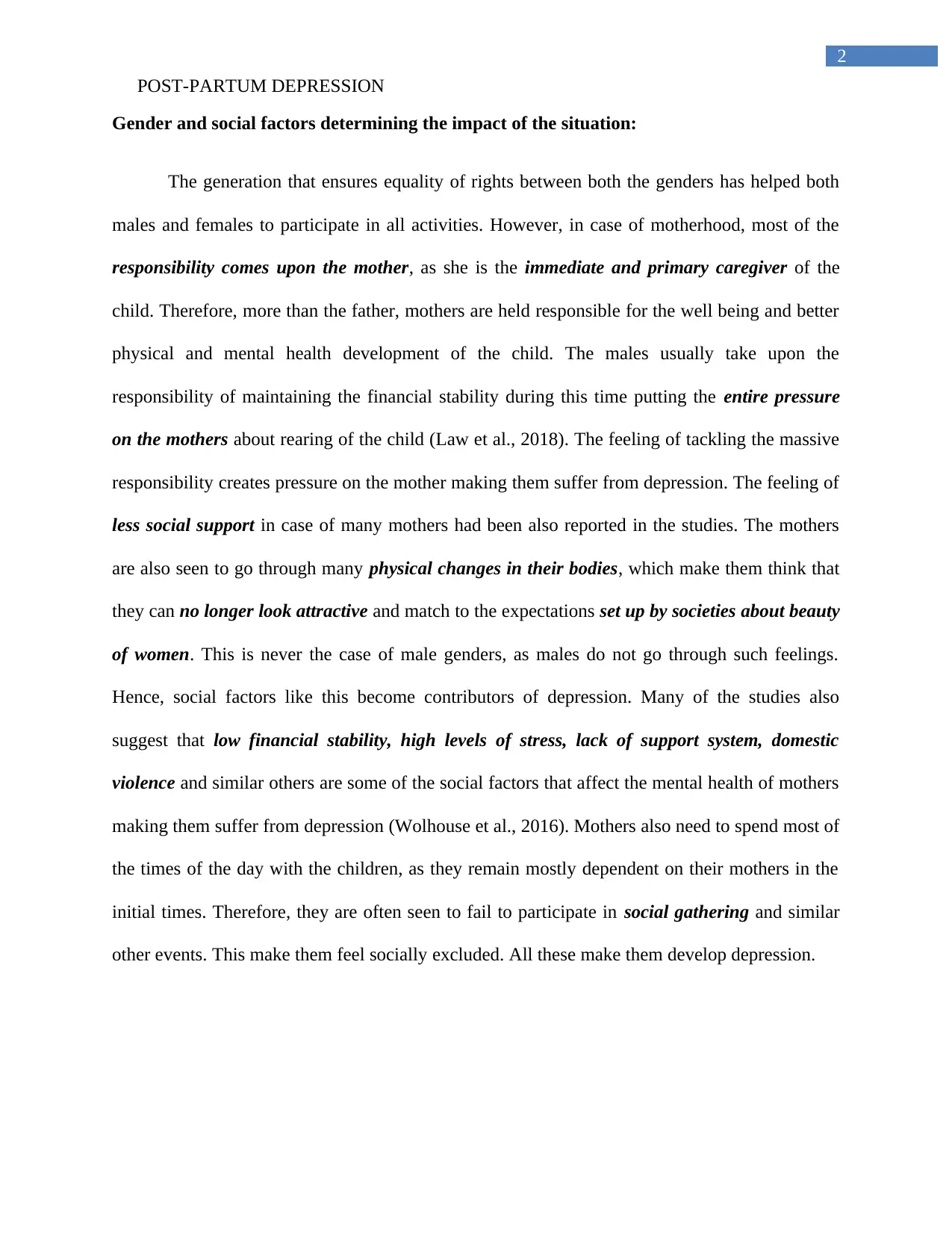
2
POST-PARTUM DEPRESSION
Gender and social factors determining the impact of the situation:
The generation that ensures equality of rights between both the genders has helped both
males and females to participate in all activities. However, in case of motherhood, most of the
responsibility comes upon the mother, as she is the immediate and primary caregiver of the
child. Therefore, more than the father, mothers are held responsible for the well being and better
physical and mental health development of the child. The males usually take upon the
responsibility of maintaining the financial stability during this time putting the entire pressure
on the mothers about rearing of the child (Law et al., 2018). The feeling of tackling the massive
responsibility creates pressure on the mother making them suffer from depression. The feeling of
less social support in case of many mothers had been also reported in the studies. The mothers
are also seen to go through many physical changes in their bodies, which make them think that
they can no longer look attractive and match to the expectations set up by societies about beauty
of women. This is never the case of male genders, as males do not go through such feelings.
Hence, social factors like this become contributors of depression. Many of the studies also
suggest that low financial stability, high levels of stress, lack of support system, domestic
violence and similar others are some of the social factors that affect the mental health of mothers
making them suffer from depression (Wolhouse et al., 2016). Mothers also need to spend most of
the times of the day with the children, as they remain mostly dependent on their mothers in the
initial times. Therefore, they are often seen to fail to participate in social gathering and similar
other events. This make them feel socially excluded. All these make them develop depression.
POST-PARTUM DEPRESSION
Gender and social factors determining the impact of the situation:
The generation that ensures equality of rights between both the genders has helped both
males and females to participate in all activities. However, in case of motherhood, most of the
responsibility comes upon the mother, as she is the immediate and primary caregiver of the
child. Therefore, more than the father, mothers are held responsible for the well being and better
physical and mental health development of the child. The males usually take upon the
responsibility of maintaining the financial stability during this time putting the entire pressure
on the mothers about rearing of the child (Law et al., 2018). The feeling of tackling the massive
responsibility creates pressure on the mother making them suffer from depression. The feeling of
less social support in case of many mothers had been also reported in the studies. The mothers
are also seen to go through many physical changes in their bodies, which make them think that
they can no longer look attractive and match to the expectations set up by societies about beauty
of women. This is never the case of male genders, as males do not go through such feelings.
Hence, social factors like this become contributors of depression. Many of the studies also
suggest that low financial stability, high levels of stress, lack of support system, domestic
violence and similar others are some of the social factors that affect the mental health of mothers
making them suffer from depression (Wolhouse et al., 2016). Mothers also need to spend most of
the times of the day with the children, as they remain mostly dependent on their mothers in the
initial times. Therefore, they are often seen to fail to participate in social gathering and similar
other events. This make them feel socially excluded. All these make them develop depression.
⊘ This is a preview!⊘
Do you want full access?
Subscribe today to unlock all pages.

Trusted by 1+ million students worldwide
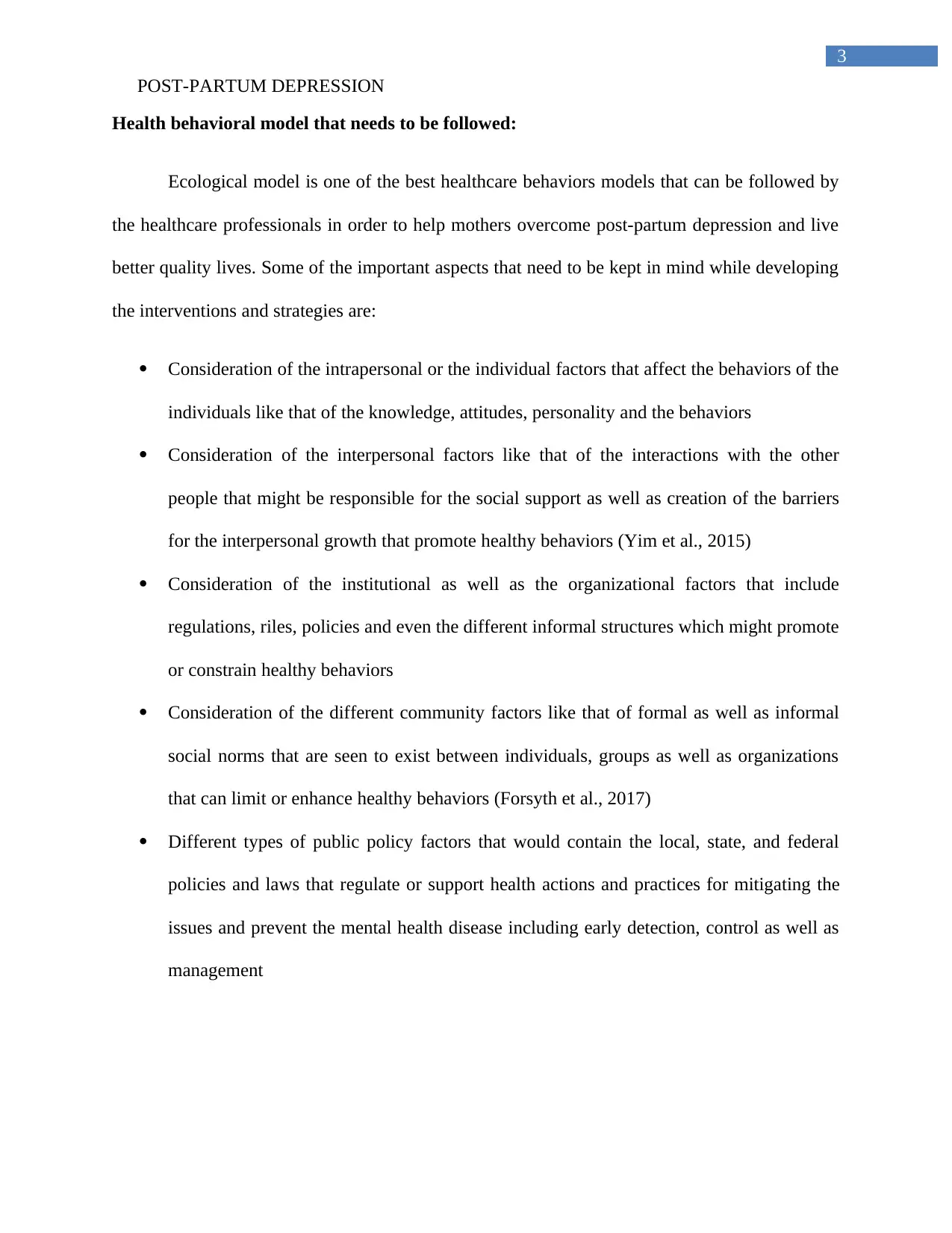
3
POST-PARTUM DEPRESSION
Health behavioral model that needs to be followed:
Ecological model is one of the best healthcare behaviors models that can be followed by
the healthcare professionals in order to help mothers overcome post-partum depression and live
better quality lives. Some of the important aspects that need to be kept in mind while developing
the interventions and strategies are:
Consideration of the intrapersonal or the individual factors that affect the behaviors of the
individuals like that of the knowledge, attitudes, personality and the behaviors
Consideration of the interpersonal factors like that of the interactions with the other
people that might be responsible for the social support as well as creation of the barriers
for the interpersonal growth that promote healthy behaviors (Yim et al., 2015)
Consideration of the institutional as well as the organizational factors that include
regulations, riles, policies and even the different informal structures which might promote
or constrain healthy behaviors
Consideration of the different community factors like that of formal as well as informal
social norms that are seen to exist between individuals, groups as well as organizations
that can limit or enhance healthy behaviors (Forsyth et al., 2017)
Different types of public policy factors that would contain the local, state, and federal
policies and laws that regulate or support health actions and practices for mitigating the
issues and prevent the mental health disease including early detection, control as well as
management
POST-PARTUM DEPRESSION
Health behavioral model that needs to be followed:
Ecological model is one of the best healthcare behaviors models that can be followed by
the healthcare professionals in order to help mothers overcome post-partum depression and live
better quality lives. Some of the important aspects that need to be kept in mind while developing
the interventions and strategies are:
Consideration of the intrapersonal or the individual factors that affect the behaviors of the
individuals like that of the knowledge, attitudes, personality and the behaviors
Consideration of the interpersonal factors like that of the interactions with the other
people that might be responsible for the social support as well as creation of the barriers
for the interpersonal growth that promote healthy behaviors (Yim et al., 2015)
Consideration of the institutional as well as the organizational factors that include
regulations, riles, policies and even the different informal structures which might promote
or constrain healthy behaviors
Consideration of the different community factors like that of formal as well as informal
social norms that are seen to exist between individuals, groups as well as organizations
that can limit or enhance healthy behaviors (Forsyth et al., 2017)
Different types of public policy factors that would contain the local, state, and federal
policies and laws that regulate or support health actions and practices for mitigating the
issues and prevent the mental health disease including early detection, control as well as
management
Paraphrase This Document
Need a fresh take? Get an instant paraphrase of this document with our AI Paraphraser
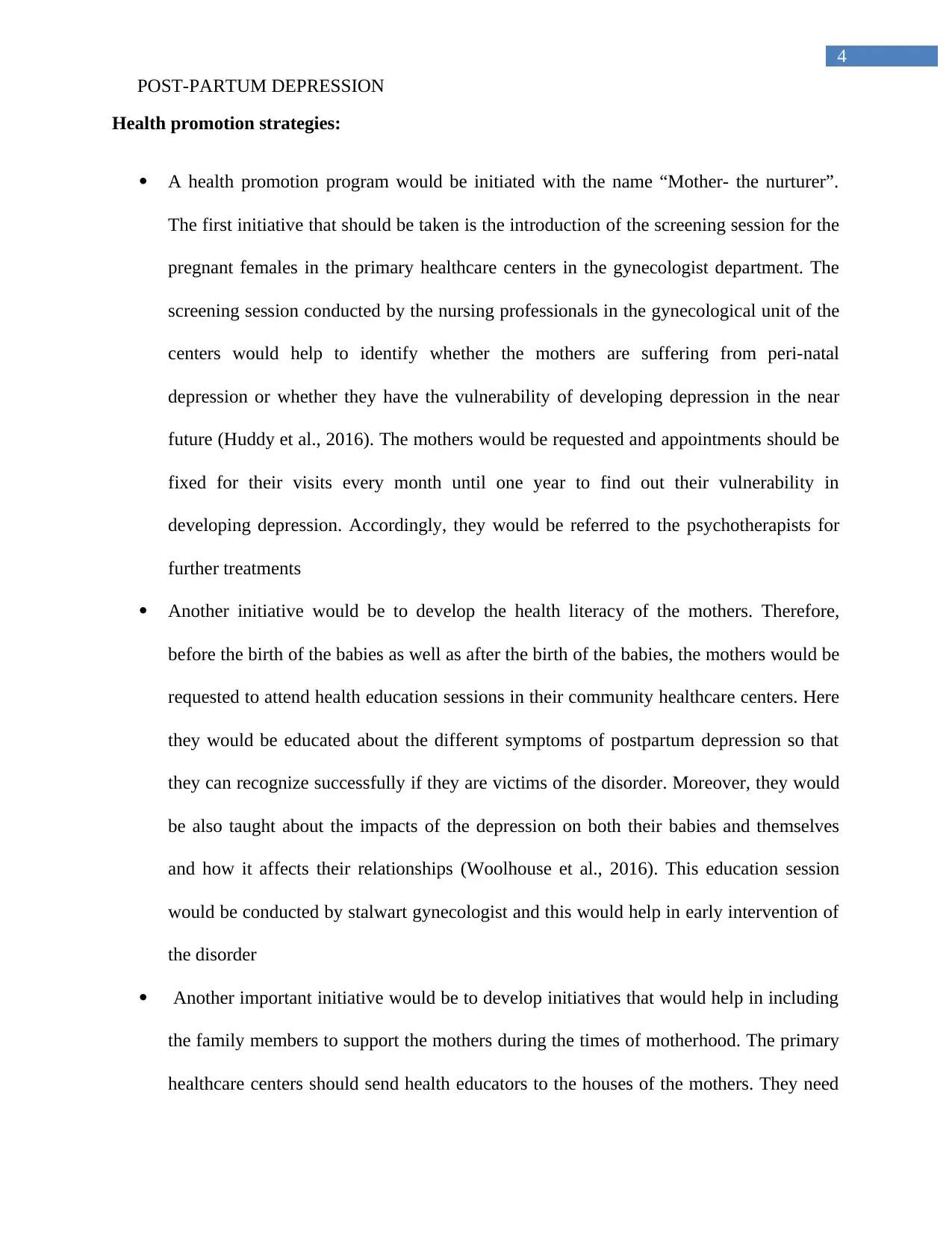
4
POST-PARTUM DEPRESSION
Health promotion strategies:
A health promotion program would be initiated with the name “Mother- the nurturer”.
The first initiative that should be taken is the introduction of the screening session for the
pregnant females in the primary healthcare centers in the gynecologist department. The
screening session conducted by the nursing professionals in the gynecological unit of the
centers would help to identify whether the mothers are suffering from peri-natal
depression or whether they have the vulnerability of developing depression in the near
future (Huddy et al., 2016). The mothers would be requested and appointments should be
fixed for their visits every month until one year to find out their vulnerability in
developing depression. Accordingly, they would be referred to the psychotherapists for
further treatments
Another initiative would be to develop the health literacy of the mothers. Therefore,
before the birth of the babies as well as after the birth of the babies, the mothers would be
requested to attend health education sessions in their community healthcare centers. Here
they would be educated about the different symptoms of postpartum depression so that
they can recognize successfully if they are victims of the disorder. Moreover, they would
be also taught about the impacts of the depression on both their babies and themselves
and how it affects their relationships (Woolhouse et al., 2016). This education session
would be conducted by stalwart gynecologist and this would help in early intervention of
the disorder
Another important initiative would be to develop initiatives that would help in including
the family members to support the mothers during the times of motherhood. The primary
healthcare centers should send health educators to the houses of the mothers. They need
POST-PARTUM DEPRESSION
Health promotion strategies:
A health promotion program would be initiated with the name “Mother- the nurturer”.
The first initiative that should be taken is the introduction of the screening session for the
pregnant females in the primary healthcare centers in the gynecologist department. The
screening session conducted by the nursing professionals in the gynecological unit of the
centers would help to identify whether the mothers are suffering from peri-natal
depression or whether they have the vulnerability of developing depression in the near
future (Huddy et al., 2016). The mothers would be requested and appointments should be
fixed for their visits every month until one year to find out their vulnerability in
developing depression. Accordingly, they would be referred to the psychotherapists for
further treatments
Another initiative would be to develop the health literacy of the mothers. Therefore,
before the birth of the babies as well as after the birth of the babies, the mothers would be
requested to attend health education sessions in their community healthcare centers. Here
they would be educated about the different symptoms of postpartum depression so that
they can recognize successfully if they are victims of the disorder. Moreover, they would
be also taught about the impacts of the depression on both their babies and themselves
and how it affects their relationships (Woolhouse et al., 2016). This education session
would be conducted by stalwart gynecologist and this would help in early intervention of
the disorder
Another important initiative would be to develop initiatives that would help in including
the family members to support the mothers during the times of motherhood. The primary
healthcare centers should send health educators to the houses of the mothers. They need
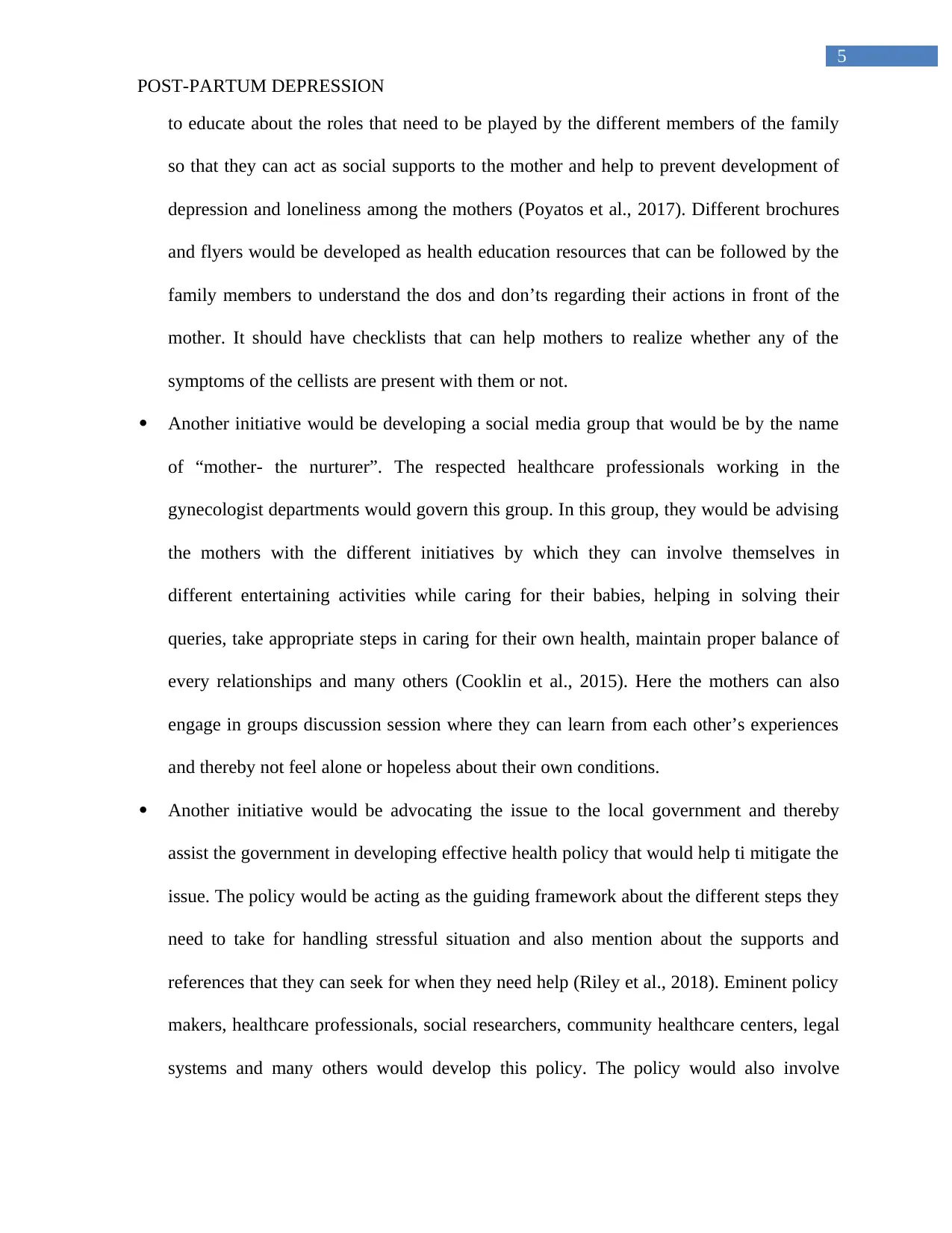
5
POST-PARTUM DEPRESSION
to educate about the roles that need to be played by the different members of the family
so that they can act as social supports to the mother and help to prevent development of
depression and loneliness among the mothers (Poyatos et al., 2017). Different brochures
and flyers would be developed as health education resources that can be followed by the
family members to understand the dos and don’ts regarding their actions in front of the
mother. It should have checklists that can help mothers to realize whether any of the
symptoms of the cellists are present with them or not.
Another initiative would be developing a social media group that would be by the name
of “mother- the nurturer”. The respected healthcare professionals working in the
gynecologist departments would govern this group. In this group, they would be advising
the mothers with the different initiatives by which they can involve themselves in
different entertaining activities while caring for their babies, helping in solving their
queries, take appropriate steps in caring for their own health, maintain proper balance of
every relationships and many others (Cooklin et al., 2015). Here the mothers can also
engage in groups discussion session where they can learn from each other’s experiences
and thereby not feel alone or hopeless about their own conditions.
Another initiative would be advocating the issue to the local government and thereby
assist the government in developing effective health policy that would help ti mitigate the
issue. The policy would be acting as the guiding framework about the different steps they
need to take for handling stressful situation and also mention about the supports and
references that they can seek for when they need help (Riley et al., 2018). Eminent policy
makers, healthcare professionals, social researchers, community healthcare centers, legal
systems and many others would develop this policy. The policy would also involve
POST-PARTUM DEPRESSION
to educate about the roles that need to be played by the different members of the family
so that they can act as social supports to the mother and help to prevent development of
depression and loneliness among the mothers (Poyatos et al., 2017). Different brochures
and flyers would be developed as health education resources that can be followed by the
family members to understand the dos and don’ts regarding their actions in front of the
mother. It should have checklists that can help mothers to realize whether any of the
symptoms of the cellists are present with them or not.
Another initiative would be developing a social media group that would be by the name
of “mother- the nurturer”. The respected healthcare professionals working in the
gynecologist departments would govern this group. In this group, they would be advising
the mothers with the different initiatives by which they can involve themselves in
different entertaining activities while caring for their babies, helping in solving their
queries, take appropriate steps in caring for their own health, maintain proper balance of
every relationships and many others (Cooklin et al., 2015). Here the mothers can also
engage in groups discussion session where they can learn from each other’s experiences
and thereby not feel alone or hopeless about their own conditions.
Another initiative would be advocating the issue to the local government and thereby
assist the government in developing effective health policy that would help ti mitigate the
issue. The policy would be acting as the guiding framework about the different steps they
need to take for handling stressful situation and also mention about the supports and
references that they can seek for when they need help (Riley et al., 2018). Eminent policy
makers, healthcare professionals, social researchers, community healthcare centers, legal
systems and many others would develop this policy. The policy would also involve
⊘ This is a preview!⊘
Do you want full access?
Subscribe today to unlock all pages.

Trusted by 1+ million students worldwide
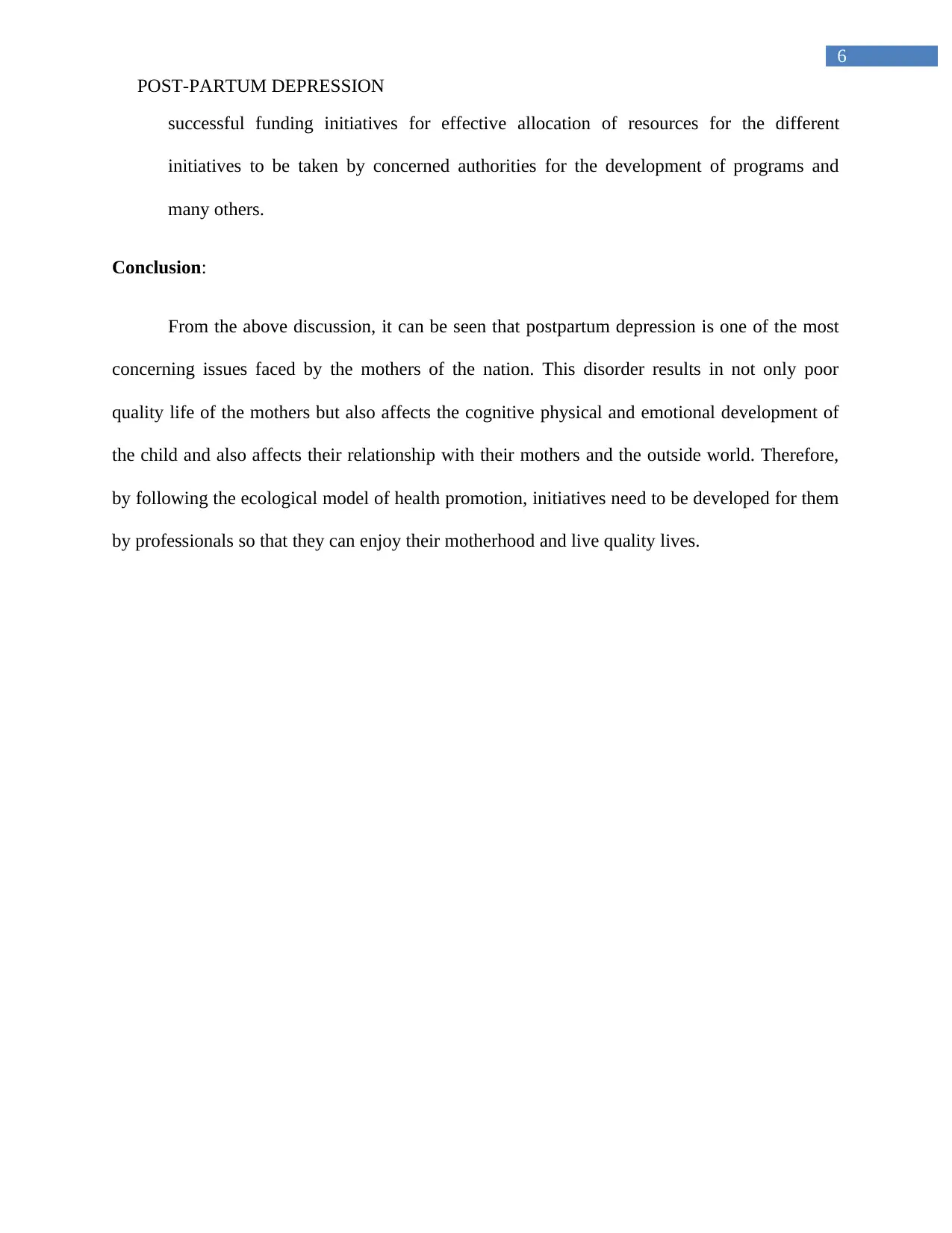
6
POST-PARTUM DEPRESSION
successful funding initiatives for effective allocation of resources for the different
initiatives to be taken by concerned authorities for the development of programs and
many others.
Conclusion:
From the above discussion, it can be seen that postpartum depression is one of the most
concerning issues faced by the mothers of the nation. This disorder results in not only poor
quality life of the mothers but also affects the cognitive physical and emotional development of
the child and also affects their relationship with their mothers and the outside world. Therefore,
by following the ecological model of health promotion, initiatives need to be developed for them
by professionals so that they can enjoy their motherhood and live quality lives.
POST-PARTUM DEPRESSION
successful funding initiatives for effective allocation of resources for the different
initiatives to be taken by concerned authorities for the development of programs and
many others.
Conclusion:
From the above discussion, it can be seen that postpartum depression is one of the most
concerning issues faced by the mothers of the nation. This disorder results in not only poor
quality life of the mothers but also affects the cognitive physical and emotional development of
the child and also affects their relationship with their mothers and the outside world. Therefore,
by following the ecological model of health promotion, initiatives need to be developed for them
by professionals so that they can enjoy their motherhood and live quality lives.
Paraphrase This Document
Need a fresh take? Get an instant paraphrase of this document with our AI Paraphraser
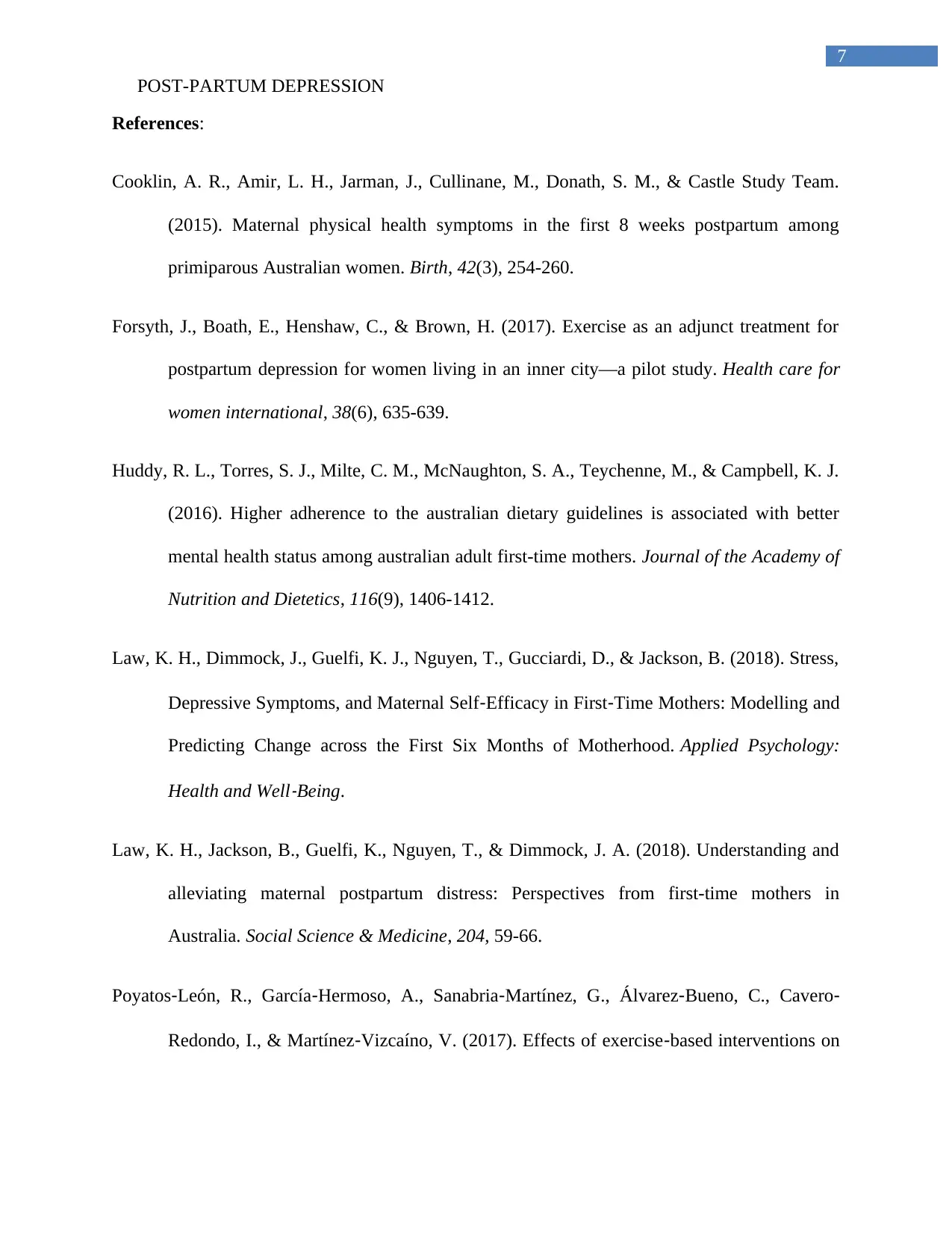
7
POST-PARTUM DEPRESSION
References:
Cooklin, A. R., Amir, L. H., Jarman, J., Cullinane, M., Donath, S. M., & Castle Study Team.
(2015). Maternal physical health symptoms in the first 8 weeks postpartum among
primiparous Australian women. Birth, 42(3), 254-260.
Forsyth, J., Boath, E., Henshaw, C., & Brown, H. (2017). Exercise as an adjunct treatment for
postpartum depression for women living in an inner city—a pilot study. Health care for
women international, 38(6), 635-639.
Huddy, R. L., Torres, S. J., Milte, C. M., McNaughton, S. A., Teychenne, M., & Campbell, K. J.
(2016). Higher adherence to the australian dietary guidelines is associated with better
mental health status among australian adult first-time mothers. Journal of the Academy of
Nutrition and Dietetics, 116(9), 1406-1412.
Law, K. H., Dimmock, J., Guelfi, K. J., Nguyen, T., Gucciardi, D., & Jackson, B. (2018). Stress,
Depressive Symptoms, and Maternal Self‐Efficacy in First‐Time Mothers: Modelling and
Predicting Change across the First Six Months of Motherhood. Applied Psychology:
Health and Well
‐Being.
Law, K. H., Jackson, B., Guelfi, K., Nguyen, T., & Dimmock, J. A. (2018). Understanding and
alleviating maternal postpartum distress: Perspectives from first-time mothers in
Australia. Social Science & Medicine, 204, 59-66.
Poyatos‐León, R., García‐Hermoso, A., Sanabria‐Martínez, G., Álvarez‐Bueno, C., Cavero‐
Redondo, I., & Martínez‐Vizcaíno, V. (2017). Effects of exercise‐based interventions on
POST-PARTUM DEPRESSION
References:
Cooklin, A. R., Amir, L. H., Jarman, J., Cullinane, M., Donath, S. M., & Castle Study Team.
(2015). Maternal physical health symptoms in the first 8 weeks postpartum among
primiparous Australian women. Birth, 42(3), 254-260.
Forsyth, J., Boath, E., Henshaw, C., & Brown, H. (2017). Exercise as an adjunct treatment for
postpartum depression for women living in an inner city—a pilot study. Health care for
women international, 38(6), 635-639.
Huddy, R. L., Torres, S. J., Milte, C. M., McNaughton, S. A., Teychenne, M., & Campbell, K. J.
(2016). Higher adherence to the australian dietary guidelines is associated with better
mental health status among australian adult first-time mothers. Journal of the Academy of
Nutrition and Dietetics, 116(9), 1406-1412.
Law, K. H., Dimmock, J., Guelfi, K. J., Nguyen, T., Gucciardi, D., & Jackson, B. (2018). Stress,
Depressive Symptoms, and Maternal Self‐Efficacy in First‐Time Mothers: Modelling and
Predicting Change across the First Six Months of Motherhood. Applied Psychology:
Health and Well
‐Being.
Law, K. H., Jackson, B., Guelfi, K., Nguyen, T., & Dimmock, J. A. (2018). Understanding and
alleviating maternal postpartum distress: Perspectives from first-time mothers in
Australia. Social Science & Medicine, 204, 59-66.
Poyatos‐León, R., García‐Hermoso, A., Sanabria‐Martínez, G., Álvarez‐Bueno, C., Cavero‐
Redondo, I., & Martínez‐Vizcaíno, V. (2017). Effects of exercise‐based interventions on
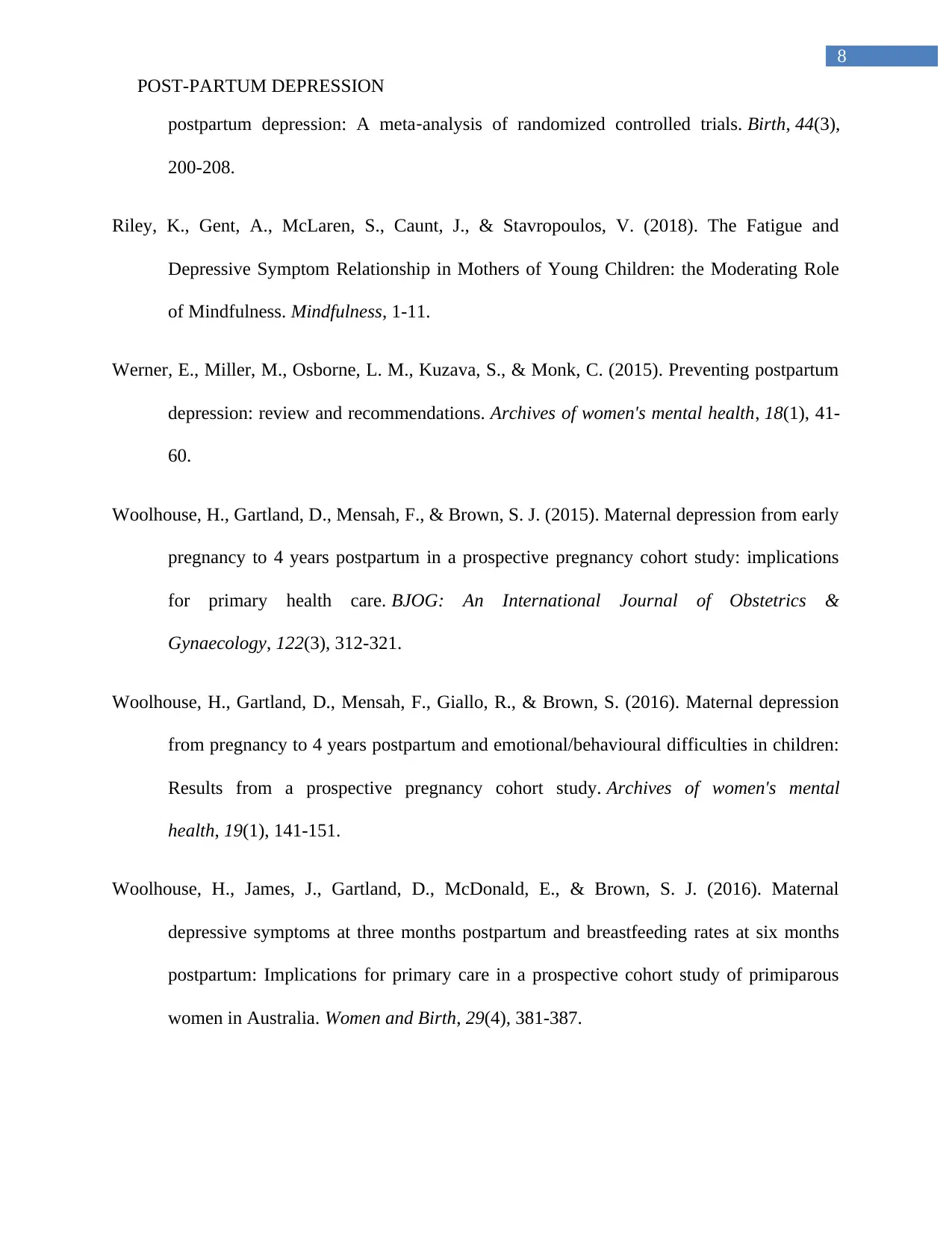
8
POST-PARTUM DEPRESSION
postpartum depression: A meta‐analysis of randomized controlled trials. Birth, 44(3),
200-208.
Riley, K., Gent, A., McLaren, S., Caunt, J., & Stavropoulos, V. (2018). The Fatigue and
Depressive Symptom Relationship in Mothers of Young Children: the Moderating Role
of Mindfulness. Mindfulness, 1-11.
Werner, E., Miller, M., Osborne, L. M., Kuzava, S., & Monk, C. (2015). Preventing postpartum
depression: review and recommendations. Archives of women's mental health, 18(1), 41-
60.
Woolhouse, H., Gartland, D., Mensah, F., & Brown, S. J. (2015). Maternal depression from early
pregnancy to 4 years postpartum in a prospective pregnancy cohort study: implications
for primary health care. BJOG: An International Journal of Obstetrics &
Gynaecology, 122(3), 312-321.
Woolhouse, H., Gartland, D., Mensah, F., Giallo, R., & Brown, S. (2016). Maternal depression
from pregnancy to 4 years postpartum and emotional/behavioural difficulties in children:
Results from a prospective pregnancy cohort study. Archives of women's mental
health, 19(1), 141-151.
Woolhouse, H., James, J., Gartland, D., McDonald, E., & Brown, S. J. (2016). Maternal
depressive symptoms at three months postpartum and breastfeeding rates at six months
postpartum: Implications for primary care in a prospective cohort study of primiparous
women in Australia. Women and Birth, 29(4), 381-387.
POST-PARTUM DEPRESSION
postpartum depression: A meta‐analysis of randomized controlled trials. Birth, 44(3),
200-208.
Riley, K., Gent, A., McLaren, S., Caunt, J., & Stavropoulos, V. (2018). The Fatigue and
Depressive Symptom Relationship in Mothers of Young Children: the Moderating Role
of Mindfulness. Mindfulness, 1-11.
Werner, E., Miller, M., Osborne, L. M., Kuzava, S., & Monk, C. (2015). Preventing postpartum
depression: review and recommendations. Archives of women's mental health, 18(1), 41-
60.
Woolhouse, H., Gartland, D., Mensah, F., & Brown, S. J. (2015). Maternal depression from early
pregnancy to 4 years postpartum in a prospective pregnancy cohort study: implications
for primary health care. BJOG: An International Journal of Obstetrics &
Gynaecology, 122(3), 312-321.
Woolhouse, H., Gartland, D., Mensah, F., Giallo, R., & Brown, S. (2016). Maternal depression
from pregnancy to 4 years postpartum and emotional/behavioural difficulties in children:
Results from a prospective pregnancy cohort study. Archives of women's mental
health, 19(1), 141-151.
Woolhouse, H., James, J., Gartland, D., McDonald, E., & Brown, S. J. (2016). Maternal
depressive symptoms at three months postpartum and breastfeeding rates at six months
postpartum: Implications for primary care in a prospective cohort study of primiparous
women in Australia. Women and Birth, 29(4), 381-387.
⊘ This is a preview!⊘
Do you want full access?
Subscribe today to unlock all pages.

Trusted by 1+ million students worldwide
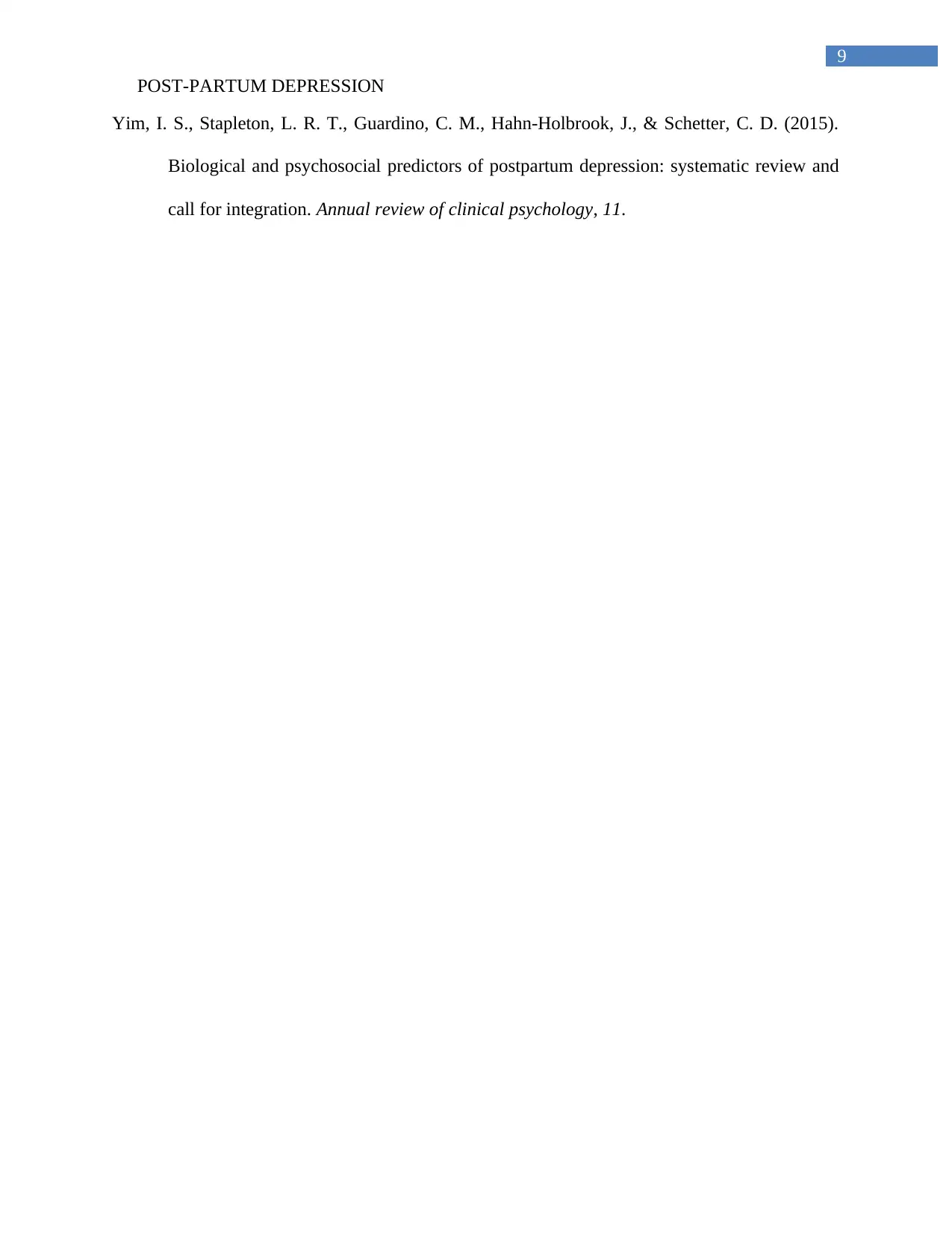
9
POST-PARTUM DEPRESSION
Yim, I. S., Stapleton, L. R. T., Guardino, C. M., Hahn-Holbrook, J., & Schetter, C. D. (2015).
Biological and psychosocial predictors of postpartum depression: systematic review and
call for integration. Annual review of clinical psychology, 11.
POST-PARTUM DEPRESSION
Yim, I. S., Stapleton, L. R. T., Guardino, C. M., Hahn-Holbrook, J., & Schetter, C. D. (2015).
Biological and psychosocial predictors of postpartum depression: systematic review and
call for integration. Annual review of clinical psychology, 11.
1 out of 10
Related Documents
Your All-in-One AI-Powered Toolkit for Academic Success.
+13062052269
info@desklib.com
Available 24*7 on WhatsApp / Email
![[object Object]](/_next/static/media/star-bottom.7253800d.svg)
Unlock your academic potential
© 2024 | Zucol Services PVT LTD | All rights reserved.




